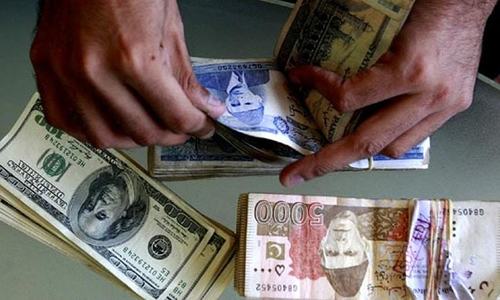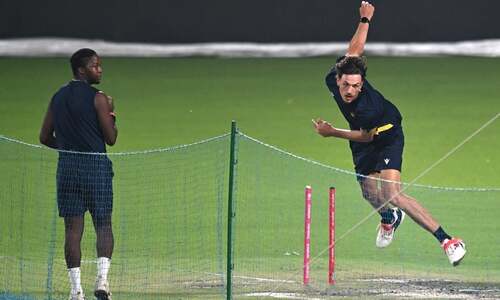
DESPONDENT Pakistanis would put their heads on the railway tracks, if they could be sure trains would arrive on time. Or they would swallow phials of cyanide, if these were not adulterated. They could always electrocute themselves, if they knew when load-shedding would occur. And they could shoot themselves, if guns were not snug in the holsters of security personnel or in the hands of militants.
Meanwhile, Pakistanis are forced to expire slowly every day.
Take our dying parliament. It is dependent upon last-minute whiffs of oxygen, desperately resuscitating itself by passing insidious resolutions unanimously in a near-empty house. The most recent one will remain on our conscience for longer than it will stay on the statute books — the attempt to obliterate at the Quaid-i-Azam University, Islamabad, the name of Dr Abdus Salam, our first Nobel laureate.
Many years ago, someone wrote that Dr Salam loved Pakistan more than Socrates loved Athens. Socrates had to drink the cup of hemlock at the hands of the Athenians only once; Dr Salam has been made to drink it by his fellow Pakistanis repeatedly. By excising his name, Pakistan has not only done him a disservice; it has lobotomised the minds of its future physicists.
Pakistanis are forced to expire slowly every day.
Take our toothless foreign policy. After 70 years of cohabitation with the United States, we have decided that even a belated too little is more than enough. We have chosen to confront our long-term benefactor the US, this time over one of its Islamabad-based officials — Col Joseph Hall, defence and air attaché. He was charged with manslaughter. It must have been galling for Washington to fly a C-130 from Afghanistan to Islamabad to collect him, and then have to return empty-handed. (He has since left the country on another aircraft.) Exactly seven years ago, in May 2011, US Stealth Black Hawk helicopters made a similar sortie, with greater success.
They flew at leisure in and out of Abbottabad, and took back as cargo Osama Bin Laden. Yet, at this fragile time, when we stand eyeball to eyeball with the US, our government has decided to replace a seasoned diplomat by a callow businessman reared in the Karachi Stock Exchange. His nomination to Wall Street might have been more appropriate.
Take our economic policy. Our annual budget has been passed without a debate, without a glance. It has become yesterday’s rubbish, relegated to the grubby hands of those who buy waste by weight.
Take our judiciary. The public is used to seeing lawyers punch each other in courtrooms. The paper-screen reputation of the judiciary has been perforated as now judges criticise each other. Over the years, many of the principles of British jurisprudence and legal canons were adopted by us. The only one left was to reincarnate another Judge Jeffries.
Of late, the cacophony at public rallies has drowned the voices of reason and common sense. Millions of rupees are being spent on banners and leaflets, not one on party manifestos. Perhaps in an age of technology, instant replays are the substitute. Who needs manifestos when broken electoral promises can be retrieved at the press of a button?
The public is told that an interim prime minister has been agreed between the prime minister and the leader of the opposition. The name is being withheld. Rightly so. The public should be the last to know. The date of the elections should be announced, and for two tiring months, the political juggernaut will lumber to its destination. And to what end?
One wonders whether anyone has factored in the possibility of the final result being rejected by a major political party? Imran Khan’s PTI tried that with flaccid success after the last elections in 2013. Mr Zulfikar Ali Bhutto’s and his PPP did just that after the ‘free and fair’ elections of December 1970. What will happen should Mr Nawaz Sharif and his PML refuse to accept the result? Will he be tempted to resort to public demonstrations and dharnas to express his dissatisfaction and repudiation of the result?
Will the next National Assembly fulfil the expectations of 104,267,581 registered voters? Will it even matter? Or will it be no better than the committee of Richard Harkness’s definition: “a group of the unwilling, picked from the unfit, to do the unnecessary”.
What will the Pakistan of 2023 be? Voters have been told to expect a ‘new Pakistan’. They should be prepared for the disappointment, similar to the one Francis Younghusband felt during his travels to Lahaul in the 1880s: “So I asked again how far Dadh was and the man said two miles. So I asked whether I could see the village, so he said yes, and showed me a village behind.”
Voters beware. Your ‘new’ Pakistan is behind you.
The writer is an author.
Published in Dawn, May 17th, 2018






























